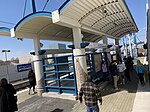Bakke Graduate University

Bakke Graduate University (BGU) is a Private online graduate school headquartered in Dallas, Texas. It has students, faculty, alumni, and courses in over 60 countries focused on urban studies, sustainable business, and Christian theology. The university is composed of three colleges: a college of Christian theology focusing on global Christian movements; a college of urban studies studying relief, development and advocacy in cities; a college of business, including a global MBA for sustainable business entrepreneurship.Typical students serve in business, government, NGO, or churches with roles as pastors, consultants, authors, urban ministers, professors or justice activists. Over 70% of BGU's faculty, students and alumni are located outside of North America with concentrations in Africa, Asia, Central America, the Caribbean, Europe, and South America. The BGU student body is significantly diverse. Students are not required to relocate from their home cities except for occasional two week long city immersions in various global cities or mentored events.
Excerpt from the Wikipedia article Bakke Graduate University (License: CC BY-SA 3.0, Authors, Images).Bakke Graduate University
Greenville Avenue, Dallas
Geographical coordinates (GPS) Address Nearby Places Show on map
Geographical coordinates (GPS)
| Latitude | Longitude |
|---|---|
| N 32.8943 ° | E -96.7539 ° |
Address
Greenville Avenue 8515
75243 Dallas
Texas, United States
Open on Google Maps






